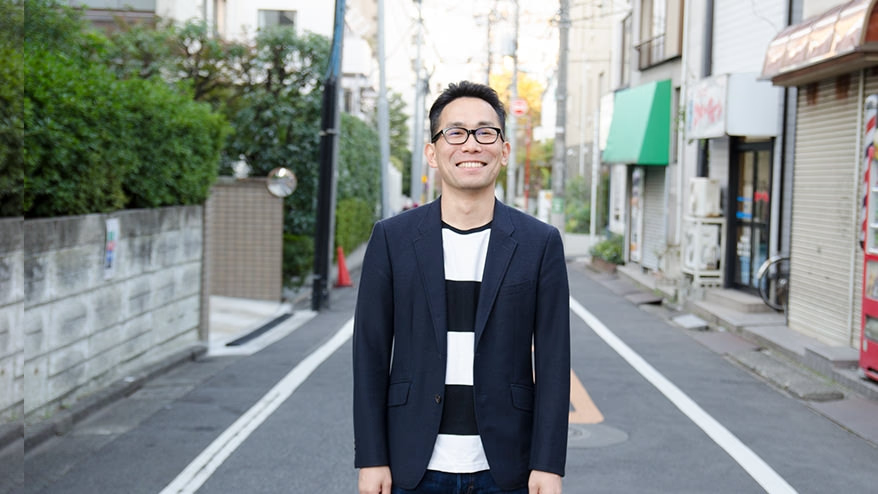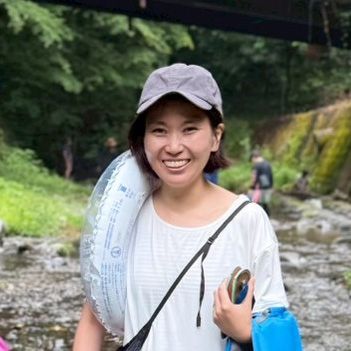This is an interview with writer Saguchi, who is in charge of writing the serials " Meguru Monasashi " and " I'll Sell Your Company! " on the Monosas site. In the first part , we asked Saguchi about what inspired her to become a writer, her training as a writer, and a glimpse of the twists and turns of her life with her mother.
In the second part, we will talk to Saguchi, who has worked on a variety of projects as a writer for over 20 years, about his approach to interviews and his stance on his work, which is different from that of a counselor, journalist, or novelist.
table of contents
Part 1 : The path to becoming a writer as a way to make money
- How Saguchi met Monosus
- Apparently writing is profitable... A formative experience in Yugawara
- I found the most reliable way to earn money using the skills I have.
- Thirty years of conflict with my mother
Part 2 : I will write articles to convey the message that it's not so bad even if things are tough
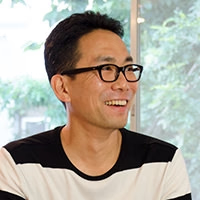
Profile of Kensaku Saguchi :
Freelance writer/interviewer He began his writing career in 1992 as a data man for the monthly magazine BIG Tomorrow (Seishun Publishing). Since then, he has been active in magazines, books, websites, and advertising production, focusing on interviews with people. He also writes about seven books a year, mainly business and health books.
Interviews and counselling
Differences in listening
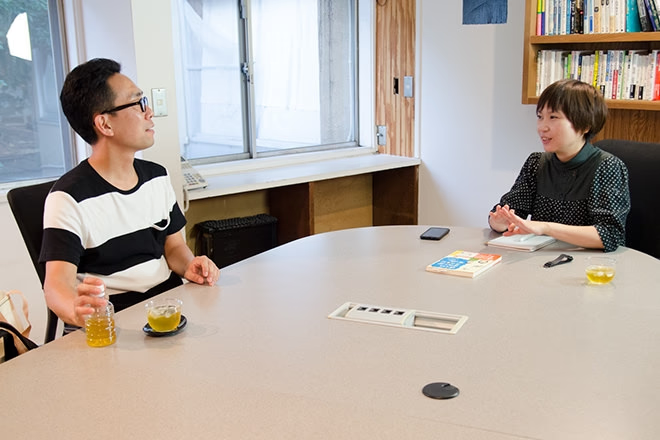
Speaker Kensaku Saguchi (left), listener in the courtyard (right)
I understand that you have qualified as an industrial counselor and have worked in that field for a while, but in terms of listening to the other person, are there any overlaps between the interviews you usually do and counseling? I would like to know if there are any similarities or differences.
Mr. Saguchi (hereafter, titles omitted)
Well... This is just what I think, so it might be wrong, but the interview is more cunning. The starting point is different.
After taking a counseling class and trying it myself, I realized that counseling is about reducing the other person's burden and listening to them in order to help them solve their problems. Attentive listening is the basis, and there is no need to think in terms of trying to draw out positive comments, solving their worries, or telling a third party what is interesting about them.
Interviews are a completely different matter. It's important that the reader feels happy or sad, that they are moved, and that they feel like they have gained something from the interview. You are interviewing someone to provide an article for them, taking up their time, and even money, so in most cases, you can't just let them talk as they like.
When I went to listen to their stories I prepared myself with an idea of what topics I would find interesting to ask, and at that point I realized that an interview and counseling were completely different things.
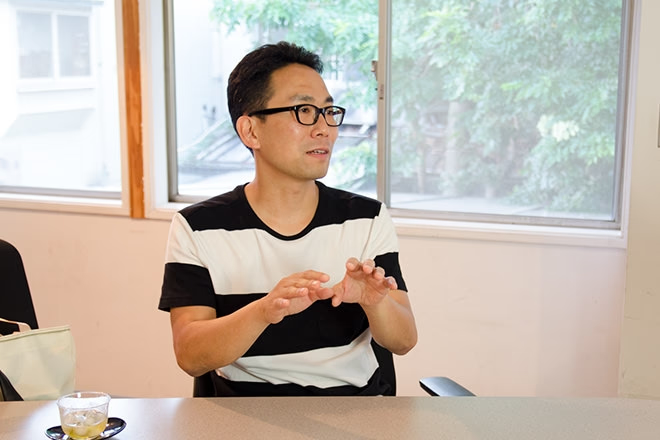
Kensaku Saguchi
Saguchi: The techniques I learned in counseling, such as repeating what the other person says, are very useful during interviews, but I use them as a technique, not to empathize with the other person. It's a bit sneaky, isn't it? It's a technique. What counselors do is also a technique, but it's done to empathize with the other person. I feel like the starting point is different.
Interviews are different from the kind of reporting that journalists do; they're like a drive fishery, or maybe it's not even fishing; they remind me of catching fish with a net, and that really resonates with me.
Courtyard, I see.
Saguchi: I don't know if this answers your question, but the monosas site is also quite similar. "Meguru Monasashi" is not like that, but "I'll sell your company!" is quite like that.
The article "I'll sell your company!" has a theme and I go to listen to the story. "Meguru Measuring Ruler" is an article that exposes relationships, so it's a bit vague and proceeds in a vague place.
Saguchi: It's the best. In terms of creating content, it's the most extravagant.
Since the courtyard is so luxurious, it must be hard for you as a writer to summarise it... Thank you as always.
In the thick, flowing river
I wrote an article titled "It's not so bad even if it's hard."
What is the most interesting job you are doing right now?
Saguchi: Is this Ima? It's the serial "Kono Hito Datte Chichi Aru" (This Man is My Father, Too) by Osamu Suzuki, a scriptwriter who helps out at Weekly Playboy.
It's an article interviewing Nakaya Dad.
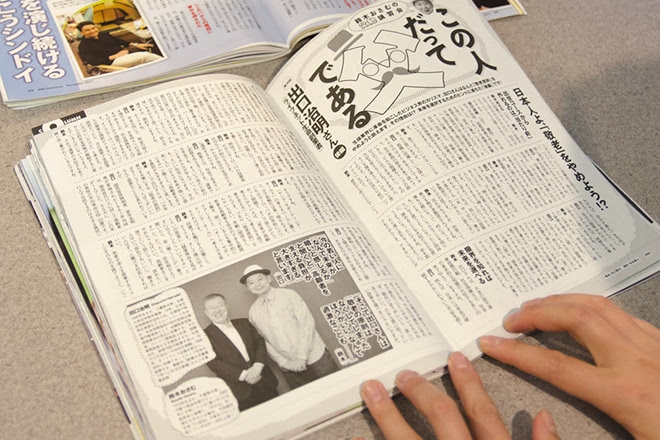
"Suzuki Osamu's Father Study Seminar: He's a Father Too" is currently being serialized in "Weekly Playboy" (Shueisha). It is a series of interviews in which Suzuki Osamu talks with senior fathers from various fields about child-rearing and work. Saguchi is in charge of the composition. (From September 2016)
Saguchi: This job is fun. As an extension of my real life as a father, the things I'm interested in become topics and articles. Suzuki-san, my editor, and I are all of the same generation, and we're all studying to be fathers. Starting with concerns about child-rearing, work, and what does a father do, we ask guests from various fields to talk about their experiences. Every episode is a luxurious one, full of empathy, laughter, and understanding.
Young people today don't read magazines, so when "BIGtomorrow" and "Playboy" were first published, they were aimed at men in their 20s, but today's readers are in their 40s, so they're almost the same age as me. The readers have the same concerns as me, so I feel lucky to have been born in the middle of the population.
courtyard
You mentioned that your stories are an extension of your own worries, but do you draw on your own experiences to find the basis for your stories? How do you ask the questions?
Saguchi : What's essential in any article is, "Why did that person start doing that thing?" The reasons vary in detail, but broadly speaking, they are all about "environment," "interest," and "economy."
Environment is the environment, country, or era in which a person grew up. Interests are the way a person thinks, what they're good at, and what they're not good at. Economics is how they earn the money to survive, and these are the core reasons for everyone.
On the other hand, I'm not particularly interested in wonderful stories, sparkling stories, idealism, or stories about social missions that are told without any awareness of such things.
I once dreamed of being a media outlet that would suggest a lifestyle and walk alongside people while saying, "Isn't that wonderful?" But when I tried it, I felt uncomfortable. I feel like the daily lives of people who live their lives aren't as neat as that.
CourtyardI want to face the world head on, where things aren't as simple as pretty words.
Saguchi: In the end, I think when people are tired, they want to hear about other people who are struggling with the same things as them, or people who seem to be in a worse situation than them, or people who have recovered from a worse situation than them.
When I'm feeling good I'm attracted to sparkly things, but I prefer stories that can reach people who are having a hard time - or rather, because I'm having a hard time myself (laughs) - and tell them that it's not so bad to be having a hard time.
What made you want to hear about how even if the courtyard is a little tough, it's not so bad?
Saguchi : I wonder if it's going to be a story like a school caste system. I've never been in a sparkly group, so I thought those guys looked like they were having fun (laughs).
When you work in Tokyo, you meet people from shiny companies, don't you? In my personal experience, for example, people who work for big companies talk about things like morning activities and studying abroad for an MBA, or say things like "Dentsu Hakuhodo is the best place to order projects because of their status," and then leave with a "we-we" vibe. I feel like I can't write what those people want to read, and there's no connection between what they want to read and what I write.
I find it more comfortable to write things that the old men my age who are rambling on in izakayas want to read.
Also, during my long period of going to the hospital every week with my mother, I felt that psychiatric and psychosomatic clinics had a very unpleasant atmosphere, but the people there also had things they liked, and would laugh if something fun was happening.
I think interview articles are good if they can provide a moment for people like that to let off some steam.
That being said, I don't have the guts to be too serious, so it's tough. There must have been many turning points, but I feel like I've always been in the thickest river, on top of the content of worries that are close to my daily life but aren't that serious, but never go away.
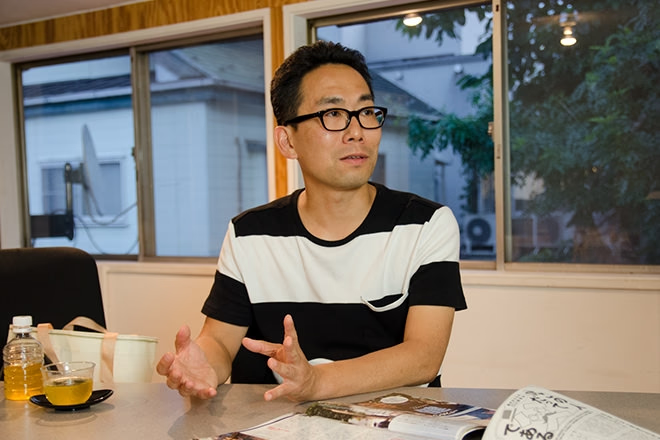
There is a wide river floating in the courtyard , and a deeper zone seems visible beside it, but would it be a bit difficult to go down that path?
Saguchi: There's the issue that doing interviews on that sort of thing is tough.
There is a problem called poverty. When the term "working poor" first started to be used, I was asked to help write a book about it, so I went to do some research. I interviewed 15 or 16 people who were in poverty, and they were all just normal people. It wasn't that they were lazy, but rather that they had just chosen the wrong place structurally.
So... I would come home after hearing stories like, "They work pretty hard, but their annual income is less than 2 million yen." I didn't know what to do with it, but the purpose of the book was to convey that the number of people like this is increasing and it's difficult, so I wrote it as it was and delivered it. And the book sold well. The editor and publisher were happy. I also got paid properly. I was happy about that, but I wondered what would happen if I didn't give anything back to the people I interviewed.
After that, there was a market for poverty issues as a reading material, so he continued to write several books, and I worked with him on the second one, but it was tough. Again, I withdrew from this.
Courtyard: Was there some kind of rule that said you shouldn't accept it as it is?
Saguchi : Well, I was just scared. I think there are people who pursue poverty issues and become writers who raise issues in society, but that seems tough. I thought I couldn't stomach it, so I went back to my original taiga (laughs). I guess I'm going to move forward with some lighter worries in life.
Love problems are something that a person can solve on their own, but there aren't many structural money problems that a person can overcome through their own efforts.
Even when I interviewed the working poor, I could write what I heard, but I didn't think writing it down would bring about any change, and I didn't think that showing the manuscript to the interviewees, not to society, would be a good idea. I thought that they would feel even more abandoned if their difficult situation was objectively viewed and evaluated. Some people said that they would read it, organize their situation, and try to do their best to be different, but most people would say, "It just made things harder for me."
There are people who just collect information, cut it up, and write articles, and there are people who really empathize with the people and do it as a matter of social justice, so the job of "writing" has a wide range.
I want to work hard in this business so that orders don't run out.
CourtyardIs there anything you most want to try right now?
It could be work, or something else.
I guess it's Saguchi . For now, I'm planning to write 100 books as a book writer and ghostwriter, and I've already written about 80, so I want to reach that number. Next, I'll aim to sell 1 million copies.
Aim for 1 million copies in the courtyard !
Saguchi: I want to aim for 1 million copies. The book I helped with last year sold 270,000 copies, so I think 1 million copies is not impossible. I also have a dream of living abroad for about a year, and I need 1 million copies to have the financial means to make that dream come true.
Well, in reality, it's probably difficult, because of my mother.
The courtyard , right?
Saguchi: I think there are a lot of people out there who have similar concerns. I think that as the readers of the magazine I work for now get older, there will be a lot of topics like this to talk about, so I thought I could write an article about that.
As long as the courtyard is alive, there will always be something to talk about.
In terms of Saguchi , perhaps being a writer is a surprisingly good career.
Courtyard (lol)
I feel like it's Saguchi .
There are a few things I don't want to do, and being a writer clears all of them.
So... yeah. As Abe-san, the cameraman I interviewed for Meguru Measuring Ruler, said, I want to keep working hard in this line of work so that I don't run out of orders in the future (laughs).
The courtyard is nice.
I hope that Saguchi will have a big hit (laughs).
Mr. Nakaniwa Saguchi, you usually work as a writer, sort of a behind-the-scenes figure, but do you have any desire to publish a book under your own name in the future?
I'd like to try releasing it , but at the same time I feel like there's no point if it doesn't sell.
There's nothing. It's surprising how little I want to say.
I'm not angry or in a lot of trouble, and I'm sure people with a strong sense of social justice would do more in-depth research on the working poor and write a book about them, but I don't have that kind of passion. My story with my mother has already been put into words, so I don't have any more stories about my family.
Nakaniwa : I wonder if it's precisely because there's "nothing" you want to write under your own name that you're able to do your current job so openly... That's why I thought it was you, Mr. Saguchi, as I was listening to you talk.
Saguchi: I really like being close to people who have something to say and saying, "Oh, I see, maybe it would be easier to get your point across if you did it this way," but when I get close to someone and ask them, "Is there anything you want to say?" I realize there isn't.
On the other hand, the state of mind of the courtyard is amazing.
I feel like Saguchi is in a zero-sum position.
It feels like Saguchi is in the mood .
The courtyard looks amazing, and I imagine it would be a good place to work.
Saguchi : Yes.
I'm wondering how to summarise this interview...
Courtyard: Occupational hazard, right? It's okay. I'm the one who's putting together this article.
Saguchi: It's easy going! (laughs)
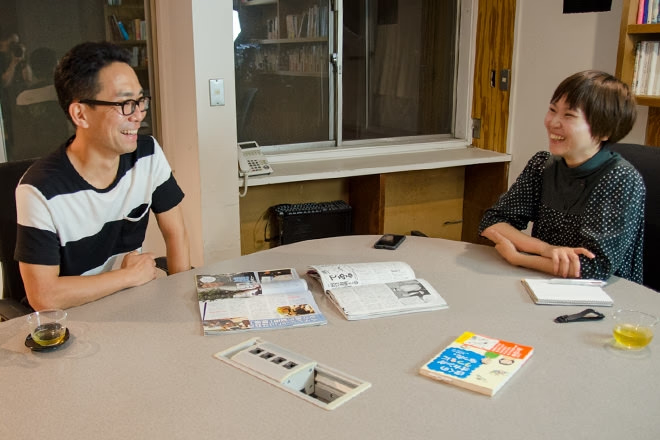
A letter to Mr. Saguchi
I met Saguchi-san while working for a certain confectionery manufacturer. After that, I asked him to write "Meguru Monasashi" (Meguru Ruler). I was surprised that he immediately grasped the meaning of the ruler and wrote a manuscript as if he were the person inside the ruler, even though I was not familiar with the direction.
Saguchi-san always has a certain warmth and presence, neither good nor bad. Perhaps that is why there is always an absolute sense of stability when Saguchi-san is on set.
Even when I asked timidly, "Isn't this a bit of a stretch?", they responded with a broad-minded "Sure," as if they had anticipated it. Their insightful response has helped me many times and I have learned a lot from them.This time, I was able to get a more three-dimensional view of Saguchi-san after hearing about his childhood, his path to becoming a writer, his mother, and his work stance. I think he is usually on the listening side, but this time he was on the speaking side, and I was happy to discover the unevenness of Saguchi-san, who always seemed to have a consistent warmth.
Although we are still inexperienced here, we would be happy to continue our relationship with the editorial team.
Next time, I'll go to the Yanakaya in Yanakaya that you recommended and do some old man watching.Editor-in-Chief of Monosasu, Yoshiko Nakaniwa
